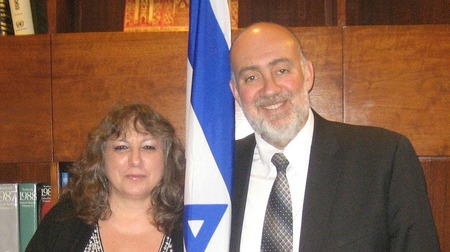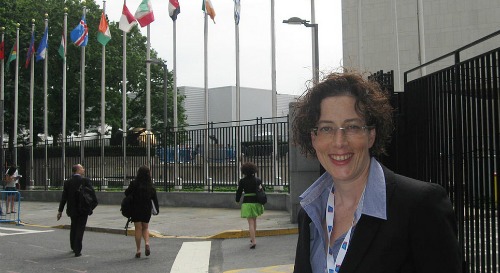Cancer activists from Israel and worldwide flew to the US in a bid to get cancer on the world health agenda. ISRAEL21c was there to take part in the event.

For Miri Ziv, director-general of the Israel Cancer Association (ICA) , the most worthwhile aspect of her work is the chance to save lives.
Armed with a message about the necessity to raise awareness and promote early intervention, Ziv recently went to United Nations headquarters in New York as part of an international advocacy plea to put non-communicable diseases (NCDs) on the global agenda.
She was brought to the US by the American Cancer Society (ACS), which flew in cancer activists, survivors and journalists from around the world. ISRAEL21c was the only media organization from Israel invited to take part in the event.
The aim: to persuade the UN to demand a coordinated effort by all governments to properly address NCDs such as cardiovascular disease, cancer, chronic lung diseases and diabetes.
“The UN doesn’t usually deal with health issues,” Cristina Parsons Perez, manager of the Latin America Cancer Initiatives at ACS, told the global gathering. “It does deal with a health issue considered to have a global development impact.”
Putting cancer on world health agenda
NCDs are responsible for 63 percent of the world’s deaths, killing 36.1 million people annually, according to an April report by the World Health Organization.
On September 19-20, the UN General Assembly will convene a high-level meeting on NCDs. Health advocates consider this a unique opportunity for the international community to take action, save millions of lives and enhance development initiatives.
“You have to die of something. But you do not have to die prematurely of something,” said Nathan Grey, ACS national vice president of international affairs. “This is a once-in-a-generation opportunity to get cancer on the world health agenda.”
Cancer advocates and experts at the New York conference were under no illusions regarding eradicating cancer entirely.
“Cancer won’t be resolved quickly; it takes time. What’s important is that we have a health summit,” Cary Adams, CEO of the International Union Against Cancer, tells ISRAEL21c.
Cancer No. 1 killer in Israel
In Israel, cancer is the No. 1 cause of death.
Ziv rolls off the figures: There are some 200,000 patients/survivors in Israel today. About 28,000 Israelis are diagnosed with cancer annually. And some 10,000 Israelis die every year from cancer.
“It’s tough to do what I do,” Ziv tells ISRAEL21c. “You can’t work at the Israel Cancer Association unless you know the work is important.”
Ziv lost her son, Oren, to melanoma and her brother, Benny, to liver cancer.
She initially joined the ICA in 1982 for professional reasons. Ten years later she agreed to lead the organization, a last request from her son.
“Oren wanted me to go on,” she says, tears welling up in her eyes. “If he thought it was important, then who am I to say it’s not?”
Israel leading global war on cancer
Israel is recognized as a remarkable source of scientific innovation and among the leading research centers for cancer.
“Young Israeli researchers are very promising,” Dr. Sandeep Kishore of Cornell University told ISRAEL21c. “The academic association in Israel is very well respected.”
In anti-tobacco policy, specifically, Israel is seen as a “role model” in the region. “The Middle East is … one of the few places in the world where smoking rates are going up,” says Dr. Michael Eriksen, founding director of the Institute of Public Health at Georgia State University. “Israel is in the unique role to serve as an exemplar. Just because you’re in this part of the world it doesn’t mean smoking rates have to go up. Israel can serve as a model for countries in the region.”

“Israeli scientists have a rich tradition of doing state-of-the-art cancer research,” adds Dr. Lawrence Shulman, chief medical officer and senior vice president for medical affairs at the Dana-Farber Cancer Institute in Boston. “They’re really good partners for collaborative research.”
Ziv is not surprised by these compliments.
“We have great scientists. Some of them we lose because they go to places where they get more money for research. The government has to invest more money in research, awareness and prevention,” she says.
In the long run, she adds, government investment will save a lot of money lost through health-care coverage and lost productivity. “For example, if you prevent lung cancer you don’t need to invest in targeted therapy that costs so much money. If you invest more money in technologies and research, it not only saves lives but also will be efficient economically.”
NCDs threaten global economy
Experts at the ACS meeting echoed Ziv’s call for governments to invest in stopping NCDs as a way to stabilize physical and human capital.
“Non-communicable diseases will evolve into a staggering economic burden in the coming years,” said David E. Bloom, professor of economics and demography at Harvard University’s School of Public Health in Boston.
“Economic policy-makers, like ministers of finance and ministers of planning, see non-communicable diseases as an issue confined to the health sector,” said Bloom. But the dangers of NCDs are “well-ensconced in the business screen of the world community.”

The global decline in productivity due to illness and deaths from NCDs will reach $35 trillion by 2030, Bloom said. That’s seven times more than the current level of global health spending.
‘It is possible to halve the morbidity rate’
The international delegates at the ACS conference were urged to push their UN representatives into action regarding the upcoming UN meeting.
Ziv said that Ron Prosor, permanent representative of Israel to the UN, promised to do his best.
“We need to intensify the global struggle against cancer, and to get this message to citizens in Israel and across the world: It is possible to halve the morbidity rate,” said Ziv.
For more than 50 years, the ICA has initiated and implemented nationwide awareness programs.
The ICA’s anti-tobacco campaigns have already made a difference. In the 1980s, 45 percent of Israelis smoked. Today, 22% of the population lights up.
The association’s Skin Cancer Awareness Week still has a way to go in persuading Israelis to stay out of the sun. But in its latest survey, the ICA reported a significant decline in death rates among Jews from melanoma skin cancer.
Says Ziv: “The most rewarding feeling from advocacy work is when you succeed to change people’s behavior, which results in saving lives.”












